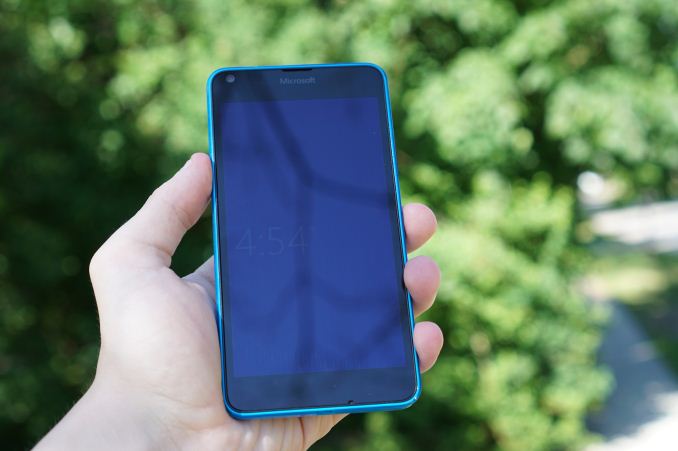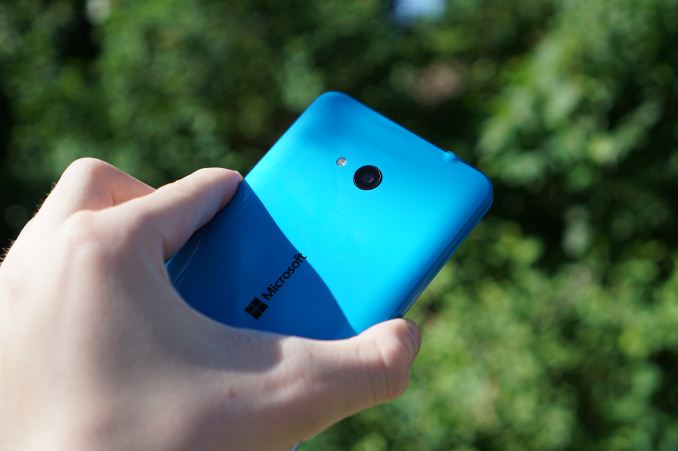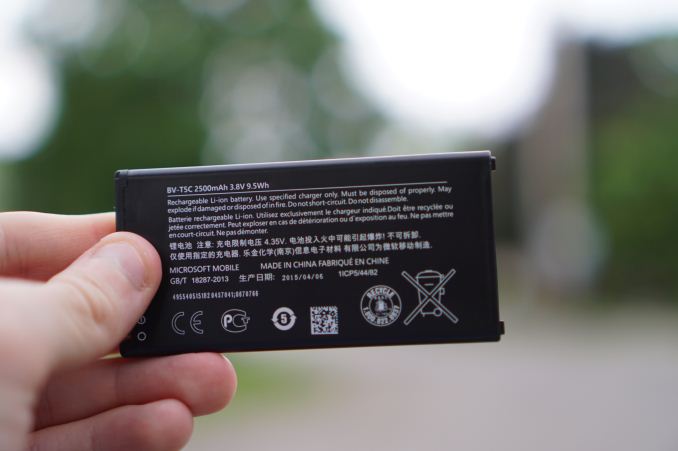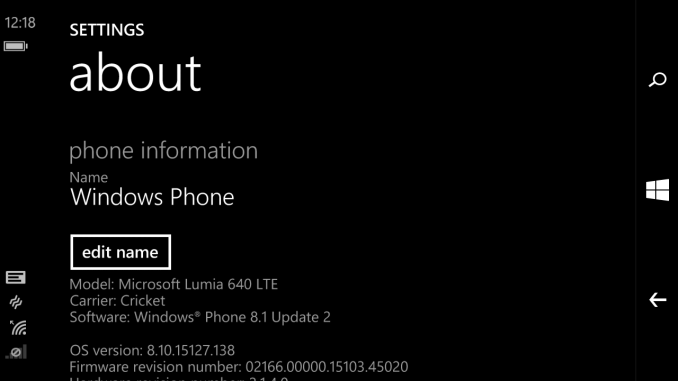The Microsoft Lumia 640 Review
by Brandon Chester on June 9, 2015 8:00 AM EST- Posted in
- Smartphones
- Microsoft
- Mobile
- Lumia
- windows phone 8
Final Words
It's honestly impossible for me to form a single opinion of the Lumia 640. I'm thankful that we don't operate using some sort of rating system where I would have to. Smartphones are comprised of many parts, both hardware and software, and all these things come together and provide an experience. Because smartphones are so appliance like, there's really no way to separate a device's hardware from its software. They need to be evaluated as a whole, and that's why coming to conclusions the Lumia 640 becomes such a difficult task. At the same time, different people value different things in a smartphone. Whether or not it will provide a good experience for you depends on the parts of a smartphone you care about most, and the parts that you're willing to accept compromises on. Because of this. it's worth breaking the Lumia 640 down to its individual parts to see what areas it excels in, and where it falls short.
For me, the best feature of the Lumia 640 is definitely its display. When Brett found that the Lumia 630 shipped with a very accurate LCD in his review, I assumed it had to be some kind of fluke. While we've certainly seen improvement to display accuracy across every price point, the 630 was as accurate as high end flagship devices. However, the Lumia 640 makes it clear to me that people at Nokia, and now at Microsoft, care about having high quality displays on their phones. The greyscale and color accuracy is amazing, and while the pixel density isn't off the charts, it's still much sharper than competing devices with qHD displays.
The Lumia 640's build quality is also something that I think stands out from the competition. Holding it in one hand with the Moto E in the other, it's clear that both are very well made devices for their price. What sets the Lumia 640 ahead is the solid and seamless design of the back cover. There are no lines or tabs that make it obvious that the back cover is removable, and I didn't even realize it myself for a short time. The glossy coating is definitely not my preference, but it goes well with the bright and colorful design of the back covers.
Camera quality has always been a focus with Lumia devices, and I don't think the Lumia 640 is an exception. The 1/4" 8MP camera is by far the best I've used on a device at this price range, and it's clear that much of this comes from the high quality post-processing that Microsoft is doing. There are so many devices that have great camera sensors but completely fail because of poor processing, and Nokia has managed to take a much lesser sensor and produce great photos.
As for the camera app itself, I am only a fan as far as the auto mode is concerned. The interface for manual controls needs work, and the implementation of shutter and ISO control is not useful at all because you can't see a preview of the changes you're making. It's almost like shooting on film, where you just have to pray that the photo turns out well. Most users will stick to the auto shooting mode anyway, but Microsoft should really fix the issues with the manual mode if they intend to offer it.
Unfortunately, the Lumia 640 isn't without its issues. Performance is definitely the first problem that comes to mind. Snapdragon 400 is really starting to show its age, and there are many performance issues that are rooted in software. Internet Explorer is simply not a fast browser, and it's immediately obvious once you try browsing the web with it. Microsoft's scroll speed cap also makes the entire operating system feel slow, and you eventually get to a point where you don't even want to use your phone because the simple task of navigating somewhere takes forever. Some areas like Action Center are also prone to stuttering and sluggish scrolling, which looks very out of place when the rest of the OS is so smooth.
Battery life is also a bit of an issue. It's certainly not bad, but it's not near as good as other devices at this price point like the Moto E. Windows Phone definitely inherited some idle battery life problems during the move from Windows CE to Windows NT, and those were very apparent during my testing as well. Despite the fact that the Lumia 640 was operating without a SIM card, the battery was always low by the early evening even when I hadn't been using it that much.
The last part of the Lumia 640's experience is the software. This is the part that I'm the most conflicted about. When you just consider features, it's clear that Windows Phone has matured significantly from its earliest iterations. Notifications are no longer an issue, and the interface has been refined with the addition of new tile sizes, more space for tiles, and folders. For the average user, the core OS has all the things they'll need from it. At the same time, the OS feels extremely slow, and there isn't anything about it that really stands out from iOS and Android.
Feature parity is fine, but you have to have parity in every respect, including third party applications. In that regard, I wasn't able to make Windows Phone work for me. The apps that do exist are mediocre and trail behind their Android and iOS counterparts on performance, quality and features. The apps that don't exist are the what really ruined things for me though, particularly the lack of Google apps. While I could switch from Drive, it would require a lot of files to be moved over. Hangouts is impossible to switch from, because it involves convincing everyone you speak to using it to switch from it as well. In the end, there are just too many key services that are inaccessible to me on Windows Phone.
In the end, I feel like the Lumia 640 is a great device as far as hardware is concerned, but for me it was let down by its software. I'm sure there are people who won't have the trouble with third party apps that I did, but I'm confident that there are a lot more people who will. Anyone who is thinking about switching over to Windows Phone should definitely take a look at the Windows Store to see if their favorite apps are available. Trying them out on a real device is also useful to check the quality of apps. If you're a user who is fine with Windows Phone and its app selection, then I think you'll enjoy the Lumia 640. It's a really great device for the price, and it's unfortunate that in my case there were just too many missing apps to make the Lumia 640 work for me.














130 Comments
View All Comments
eanazag - Tuesday, June 9, 2015 - link
I hated Symbian. Buh-bye Symbian.Callum S - Tuesday, June 9, 2015 - link
Nice review. I definitely think that it is a fantastic phone for its price.I can see how the apps situation for some would be a pretty big concern. As mentioned it is mainly Google and local apps that are missed. However at the same time, for those using Microsoft services, I have found it to be significantly better than Android. Exchange, OneDrive, OneNote and MS Office Apps all work beautifully and the ability to pin the live tiles for each to the home screen has saved myself tonnes of time.
That blue glossy case - yep, I would probably want to pass on that too. The matte black version is however also available and in my opinion much better.
I am not too sure about the performance though - especially at the price bracket. After breaking a Nokia 930 I tried to use an old HTC One M7 for a while, before finally buying a Lumia 640, and found the performance of that to be horrible after updating. However perhaps that was due to the HTC sense customisations or something?
My original intention was to use the Lumia 640 until the Lumia 940 with Windows Mobile 10 is released however I am not too sure I'll be able to justify the upgrade now...
Callum S - Tuesday, June 9, 2015 - link
*HTC Sense customisationsWolfpup - Tuesday, June 9, 2015 - link
The HTC stuff may not help, but from my experience Android is just dog slow. I've got a Surface 1 running (almost) real Windows 8, and it runs circles around faster ARM hardware running Android, which is just laughable considering how much better Windows is than Android.Presumably Windows Phone has even lighter system requirements, so... Although who knows about that, given real Windows is probably optimized out the wazoo, while Windows Phone doesn't get as much attention, but still, my Windows Phones all feel fine, while my android stuff running on anything less than the highest end hardware feels slow.
testbug00 - Tuesday, June 9, 2015 - link
Android runs fine when you don't skin it. Moto G/E use A7 quad cores. I believe the original Moto E used a dual core even.And, based on crash reports I've seen, Windows Phone seems to use under 125MB of RAM for the OS.
Daniel Egger - Tuesday, June 9, 2015 - link
Nope, Moto E (2nd gen) runs 4xA53 not A7. Also not to be underestimated the Moto E has a lower screen resolution.mkozakewich - Tuesday, June 9, 2015 - link
In my experience, a proper operating system like Windows or OS X runs a lot faster than some generic, unoptimised version of Linux. I had a netbook with a quick-boot Linux thing, and I could actually turn off my backlight completely when I used it, but my battery would actually drain quicker than when I'd have the screen on in Windows.leexgx - Thursday, June 11, 2015 - link
unlike Android it's a requirement that all apps use GPU acceleration under normal use on windows even on old/new crappy 512mb windows phones run Very consistently (more like IOS iPhone/iPad) with Android your having to use Brute force with faster Flash and CPU (android is only been optimised now in 5.0)testbug00 - Tuesday, June 9, 2015 - link
probably HTC stuff. I have a Moto G (whatever year the original was released in) and it runs Android smoothly. It's a lot weaker than the M7 ;)WorldWithoutMadness - Tuesday, June 9, 2015 - link
Cmon microsoft, just give us sneak preview of 940 already. I'm sick of this badly chosen hardware budget phone.It's not even good enough in super saturated budget phone market in developing country.